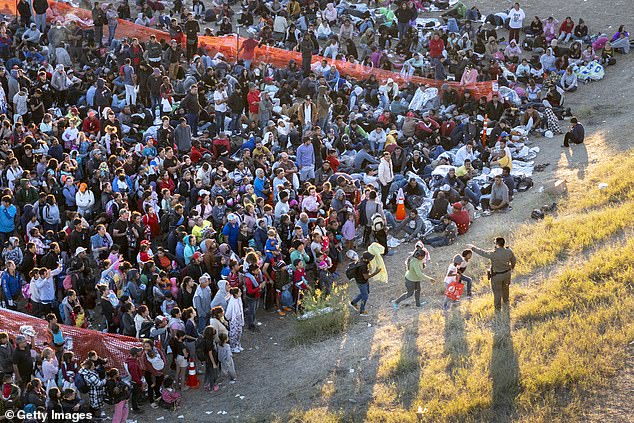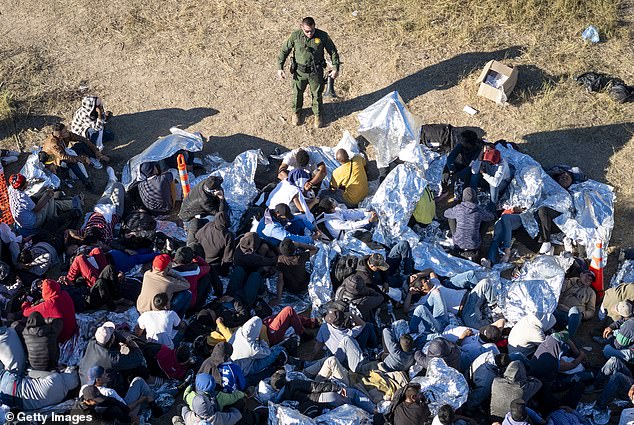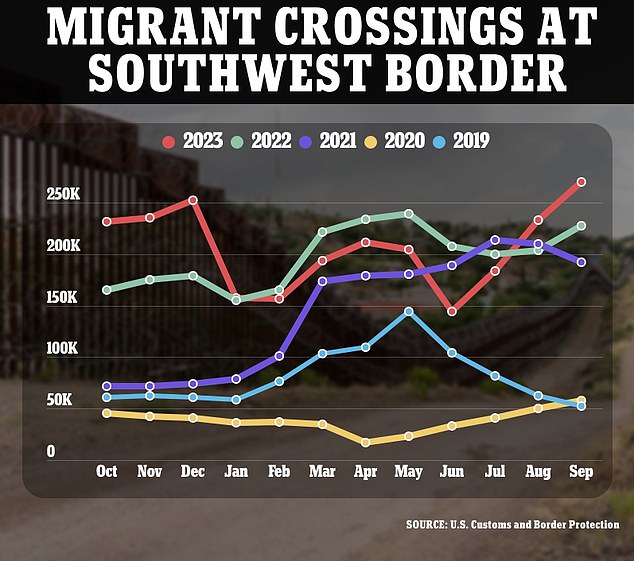Border security negotiations STALL as Republicans accuse Democrats of keeping them in the dark: Chances for a deal before Christmas are slim and aid to Ukraine and Israel won’t come until January
- Senators met late Sunday and Homeland Security's Alejandro Mayorkas returned to the Capitol for negotiations
- Border agents are overwhelmed after the single-day total last week exceeded 10,000 illegal aliens entering the US through the southern border
- Republicans have insisted they will not agree to President Biden's $110 billion aid request without seeing specific details about the border provisions.
Talks over a border security and foreign aid package continued through the weekend — but no deal is in sight and the year will end without a vote.
On Sunday, GOP leader Mitch McConnell sent an update to senators thanking James Lankford for negotiating with Democrats. He noted that “progress is being made,” but that there are “important issues still under discussion and a lot of highly technical work has been done on the setup.”
Senators met late Sunday and Homeland Security's Alejandro Mayorkas returned to the Capitol for negotiations.
The Senate was scheduled to vote on the nominations this week — after Majority Leader Chuck Schumer postponed the holiday recess in hopes of a deal.
The talks gained renewed attention when Ukrainian President Volodymyr Zelensky came to Capitol Hill last week.
But after meeting with Zelensky, Chairman Mike Johnson appeared to back the cause, but remained unchanged in his view that aid for the country's war with Russia should come with strict border regulations.

EAGLE PASS, TEXAS – DECEMBER 17: In an aerial view, a US Border Patrol agent organizes migrants waiting to be processed after crossing from Mexico into the US.
Republicans have insisted they will not agree to President Biden's $110 billion aid request without seeing specific details about the border provisions.
“Senator Schumer thinks a deal is going to be made behind closed doors and rushed through the Senate and then blocked from the House — that's not going to happen,” Sen. John Cornyn, R-Texas, said on Fox News on Sunday.
“This isn't just about money, this is about policies that will actually stop the flow of mass migration across the border, along with the drugs and everything that comes with it.”
One idea being considered is to allow Homeland Security officials to stop migrants from seeking asylum at the southern border if the total number of crossings in a day exceeds 5,000.
Border agents have been overwhelmed after totals of more than 10,000 illegal aliens entering the U.S. through the southern border each day last week.
Biden's additional request included $61 billion for Ukraine, $14 billion for Israel, $9 billion for humanitarian assistance, $11 billion for border and migrant-related matters and $2 billion for the Indo-Pacific region.

A U.S. Border Patrol agent speaks with immigrants awaiting processing after crossing into the United States from Mexico on December 17

Migrants make their way through barbed wire after crossing the Rio Grande into the United States on December 17

Only nine Republicans need to vote for the package to pass the Senate if all Democrats vote for it, although Democratic opponents are expected. The House is a different story.
Hardliners on both sides of the aisle in the House of Representatives are expected to oppose the deal: Conservative Republicans will say it falls short of H.R. 2, their party-line immigration bill, and that it opposes aid to Ukraine be general. Progressive Democrats will oppose border restrictions.
Earlier this week, CBS reported that the White House was open to establishing a Title 42-style border authority to expel migrants without asylum screening and expand immigration detention and deportation in exchange for the foreign aid.
Another is detaining people seeking asylum at the border, including families with children, and negotiators have been looking for ways to quickly remove migrants who have been here less than two years and have not sought asylum.
Major immigration reforms have not been codified into law since 1986 with the Immigration Reform and Control Act.
